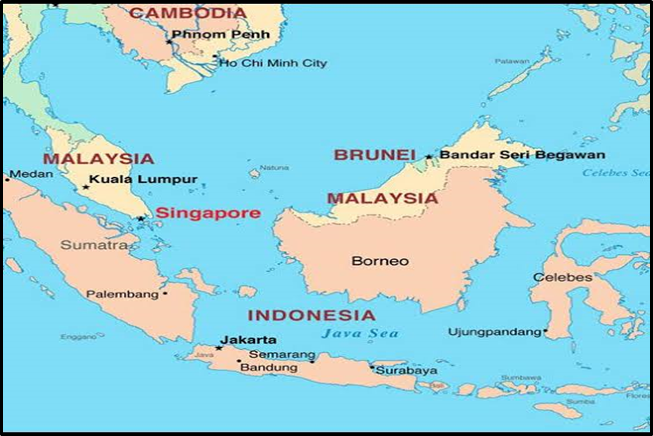PM WRAPS UP BRUNEI VISIT, REACHES SINGAPORE
Syllabus:
GS 2:
- India and neighborhood relation
- Effects of policies and politics of various nations on India.
Focus:
- Prime Minister Narendra Modi’s recent visits to Brunei and Singapore have garnered attention due to discussions on maritime security, regional cooperation, and economic partnerships. His emphasis on development over expansionism and reinforcing diplomatic ties with Southeast Asian nations comes amid rising tensions in the Indo-Pacific region.
Source: MapofIndia
Focus on Development Over Expansionism:
- PM’s Statement: During his visit to Brunei, Prime Minister Narendra Modi emphasized India’s commitment to a policy of development rather than expansionism, highlighting the need for respecting “freedom of navigation and overflight.”
- Context: His remarks come amid increased tensions in the South China Sea, where territorial disputes are prevalent, and China’s aggressive actions have been a concern.
- Support for UNCLOS: Modi reinforced India’s support for international laws, particularly the United Nations Convention on the Law of the Sea (UNCLOS), which governs maritime rights and freedoms.
- Code of Conduct: He advocated for the finalization of a code of conduct in the region to ensure peace and stability.
- Brunei’s Maritime Claims: Brunei, which has its maritime claims in the South China Sea, aligns with India’s stance on respecting international maritime laws.
About United Nations Conventions on Laws of the Sea (UNCLOS), 1982
|
Strengthening India-Brunei Relations
- Anniversary Celebration: Modi congratulated Brunei’s Sultan Haji Hassanal Bolkiah on the 40th anniversary of Brunei’s independence and highlighted Brunei’s progress under his leadership.
- Diplomatic Ties: This year marks the 40th anniversary of diplomatic relations between India and Brunei, which both nations are commemorating by enhancing their partnership.
- Areas of Cooperation: The leaders discussed expanding cooperation in various sectors including defense, connectivity, trade, energy (including renewables), space, ICT, health, education, culture, tourism, and regional security.
- Joint Statement: A joint statement from the bilateral talks reiterated the commitment to peace, stability, maritime safety, and security, urging all parties to resolve disputes peacefully in line with international law.
- Enhanced Partnership: Both leaders agreed to deepen the bilateral relationship by focusing on areas of mutual interest and collaboration.
Upcoming Singapore Visit
- Arrival in Singapore: Indian PM arrived in Singapore on Wednesday, following his visit to Brunei. He met with Singapore’s Prime Minister Lawrence Wong for a meal before official talks.
India-Singapore Relations:
Historical Background:
- Historic ties date back to 1819 with Sir Stamford Raffles’ trading post.
- India was a pioneer in recognizing Singapore’s independence in 1965.
Trade and Economic Cooperation:
- Singapore is a major trade partner, accounting for 27.3% of India’s ASEAN trade in 2021-22, and a leading FDI source with $136.653 billion over 20 years.
- The 2005 CECA and initiatives like UPI-PayNow integration enhance trade and investment.
Defence and Security Cooperation:
- Strategic partnership since 2015 focuses on Indo-Pacific stability and maritime security.
- Key agreements include the Defence Cooperation Agreement (2003) and Naval Cooperation Agreement (2017), with joint exercises like SIMBEX and SINDEX.
Education, Science, and Technology Cooperation:
- DST-CII Technology Summit (2022) highlights joint work in AI, fintech, and smart manufacturing.
- ISRO launched Singapore’s first micro-satellite in 2011; future collaboration includes digital infrastructure and Proxtera-ONDC integration.
Cultural and People-to-People Ties:
- Indian diaspora makes up 9.1% of Singapore’s population, enriching cultural and economic ties.
- ASEAN-India Pravasi Bharatiya Divas (2018) celebrated 25 years of partnership.
Cooperation in Infrastructure Development:
- Singapore’s expertise supports India’s smart city and infrastructure projects.
- Active involvement in developing industrial parks, airports, and urban infrastructure in India.
Challenges in India-Singapore Relations:
- Trade Imbalance: India faces a trade deficit with Singapore, where imports exceed exports, leading to concerns about economic equilibrium in the bilateral trade relationship.
- Investment Barriers: Indian companies often encounter regulatory and bureaucratic hurdles in Singapore, impacting investment flows and operational efficiency.
- Regional Tensions: Geopolitical dynamics in the Indo-Pacific, including China’s influence, can complicate strategic alignments and affect bilateral cooperation.
- Differences in Economic Priorities: Divergent economic priorities and policy approaches may hinder collaborative projects and joint ventures between the two nations.
- Cultural and Administrative Gaps: Differences in cultural practices and administrative procedures can create challenges in smooth bilateral engagements and mutual understanding.
Way Forward : Diplomatic Ties with SouthEast Asia Amid Indo-Pacific Tensions
- Strengthen Regional Alliances: Build stronger bilateral and multilateral alliances with Southeast Asian nations, particularly through forums like ASEAN, to foster collective security and stability.
- Enhance Economic Cooperation: Focus on expanding trade, investment, and technology partnerships in sectors such as digital innovation, energy, and infrastructure development.
- Promote Maritime Security: Collaborate on maritime safety, freedom of navigation, and adherence to international laws like UNCLOS to counter aggressive postures in the region.
- Increase Defense Cooperation: Strengthen defense collaborations through joint exercises, intelligence sharing, and capacity-building initiatives with Southeast Asian countries.
- Expand Cultural and Educational Exchanges: Deepen people-to-people ties through educational programs, cultural exchanges, and capacity-building initiatives to solidify long-term relations.
- Support Sustainable Development Goals: Partner on climate change, renewable energy, and sustainable development projects to address common challenges and enhance regional cooperation.
Conclusion
The visit strengthens India’s strategic partnerships with Brunei and Singapore, promoting peace, maritime security, and economic cooperation. By advocating development over expansionism, India reaffirms its commitment to a rules-based international order, fostering stability and collaboration in the Indo-Pacific.
Source:Indian Express
Mains Practice Question:
Discuss India’s approach towards maritime security and regional cooperation in the Indo-Pacific region, with reference to Prime Minister Narendra Modi’s recent visits to Brunei and Singapore. How can India balance its developmental goals with strategic interests?
Associated Article:
https://universalinstitutions.com/india-singapore-relations/




